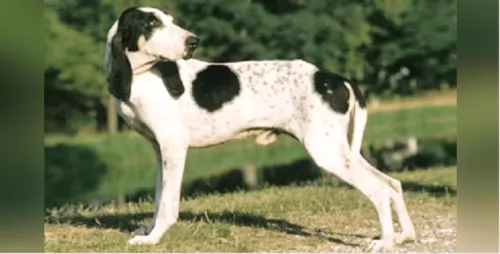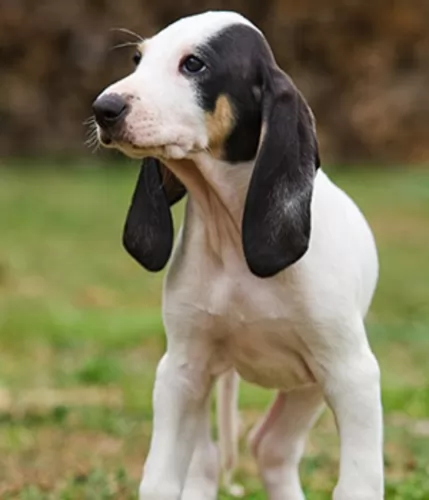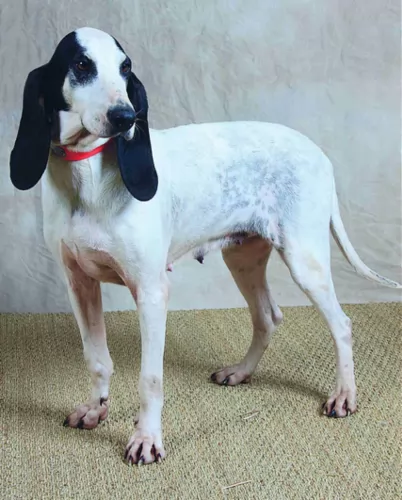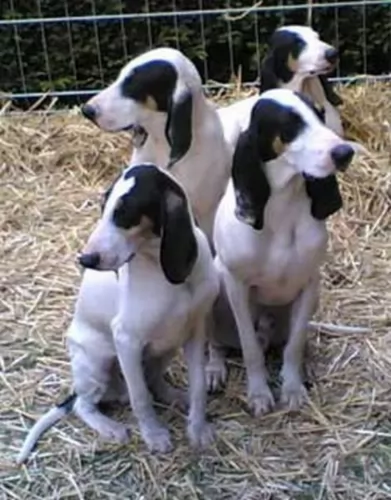 Petzlover
Petzlover Ariegeois is originated from France but Tibetan Mastiff is originated from China. Ariegeois may grow 25 cm / 9 inches shorter than Tibetan Mastiff. Ariegeois may weigh 63 kg / 138 pounds lesser than Tibetan Mastiff. Both Ariegeois and Tibetan Mastiff has same life span. Both Ariegeois and Tibetan Mastiff has same litter size. Ariegeois requires Low Maintenance. But Tibetan Mastiff requires Moderate Maintenance
Ariegeois is originated from France but Tibetan Mastiff is originated from China. Ariegeois may grow 25 cm / 9 inches shorter than Tibetan Mastiff. Ariegeois may weigh 63 kg / 138 pounds lesser than Tibetan Mastiff. Both Ariegeois and Tibetan Mastiff has same life span. Both Ariegeois and Tibetan Mastiff has same litter size. Ariegeois requires Low Maintenance. But Tibetan Mastiff requires Moderate Maintenance
 The Ariegeois is a fairly new breed, believed to have originated in France in 1912. As a scent hound, it is a blend of 3 French scent hounds - Grand Gascon-Saintongeois, Grand bleu de Gascon and the Briquet.
The Ariegeois is a fairly new breed, believed to have originated in France in 1912. As a scent hound, it is a blend of 3 French scent hounds - Grand Gascon-Saintongeois, Grand bleu de Gascon and the Briquet.
Just to show you how ancient these breeds are, the Grand bleu were thought to have been brought to France by an ancient civilization, the Phoenicians, who traded wares and dogs. The Briquet is native to southern France but they have been used as hunting dogs as far back as pre-Roman times.
As the breeds mixed, the Ariegeois came about. A popular pack dog emerged with an excellent sense of smell that would stand the dog in good stead for hunting. Today, while still fairly uncommon beyond French borders, the dog is highly regarded for its extraordinary hunting abilities and his loyal, affectionate nature towards his human companions.
 The Tibetan Mastiff is still considered to be a primitive breed originating in Tibet centuries ago. The breed was developed to guard property and livestock. They still do this as well as being a much loved family dog and a show dog as well. There is very little history that is documented for the breed prior to the 19th century.
The Tibetan Mastiff is still considered to be a primitive breed originating in Tibet centuries ago. The breed was developed to guard property and livestock. They still do this as well as being a much loved family dog and a show dog as well. There is very little history that is documented for the breed prior to the 19th century.
Believed to be centuries old with ancestors who are mastiff like dogs that developed into two different types of Tibetan Mastiffs. These types are the Tsang-Khyi and the Do-Khyi. The Tsang Khyi were guardians for Tibetan monks, while the Tsang-Khyi guarded flocks for nomadic shepherds and in villages.
The first Tibetan Mastiff was imported in 1847 to England and presented as a gift to Wueen Victoria, from India’s Viceroy. By 1873 there was an English Kennel Club and the breed was labeled a large dog from Tibet and entered into the EKC Stud Book.
The next year the future King Edward VII, brought another two Tibetan Mastiffs to the United Kingdom to show in 1875. The first breed club began in 1931. The world wars interfered and no new dogs were imported to England until 1976. Two dogs were given to the President of the United States in the late 1950’sbut were not bred and it wasn’t until 1970 that any more were imported. The US Tibetan Mastiff Club was not founded until 1974 and they were first entered in a National Specialty show in 1979.
In 2007 the AKC recognized the breed as a working dog since 2007. It’s hard to find a purebred Tibetan Mastiff in Tibet anymore.
 The amicable-looking medium-sized Ariegeois dog, also known as the Ariege Hound, has a lean, muscled body. This dog breed isn’t just suitable as as working breed, but his kind face tells you he has a good temperament and he makes for an affectionate family pet and friend as well.
The amicable-looking medium-sized Ariegeois dog, also known as the Ariege Hound, has a lean, muscled body. This dog breed isn’t just suitable as as working breed, but his kind face tells you he has a good temperament and he makes for an affectionate family pet and friend as well.
The Ariegeois gets along well with children in the family. Gentle and patient, you want to teach your children to also be gentle, patient and kind around this affectionate canine. Early socialization and training, as with any dog breed, will be important for this energetic dog, and training will make him a wonderful family pet.
With their trim, athletic build, deep chest and slightly forward lean similar to that of a Pointer dog, the scenthound’s white coat with black markings is short and smooth.
One of the more noticeable features of the dog is his long ears which are lovely and soft to touch. With his dark brown, soulful eyes, his black nose and slightly curved tail, the Ariegeois has a deep, throaty bark.
 Both types of Mastiffs can be present in the same litter, so that both larger and smaller pups are present. Both types are well-muscled and structured. Today’s dogs being developed in China and the West are much larger than the previous ones. These dogs would be less useful to the nomads and cost too much to feed. Today’s dog is very large with a large head and a long double coat. This coat can be black, brown, gold, and blue, with or without tan markings. There are now a few white Tibetan Mastiffs being bread.
Both types of Mastiffs can be present in the same litter, so that both larger and smaller pups are present. Both types are well-muscled and structured. Today’s dogs being developed in China and the West are much larger than the previous ones. These dogs would be less useful to the nomads and cost too much to feed. Today’s dog is very large with a large head and a long double coat. This coat can be black, brown, gold, and blue, with or without tan markings. There are now a few white Tibetan Mastiffs being bread.
The breed standard for the Mastiff is different in the West than in the East. In the East the breed is broken into two categories – the Lion Head and the Tiger head.
 Your wonderful Ariegeois wants to be your lifelong companion, and you can expect all the wonderful characteristics to be evident in this canine if you buy him from a reputable breeder. When you bring him home, make sure he has a warm, dry, comfortable sleeping area, and in exchange for this provision he will be your loyal, devoted friend.
Your wonderful Ariegeois wants to be your lifelong companion, and you can expect all the wonderful characteristics to be evident in this canine if you buy him from a reputable breeder. When you bring him home, make sure he has a warm, dry, comfortable sleeping area, and in exchange for this provision he will be your loyal, devoted friend.
Spayed or Neutered saves you from Unwanted Puppies
If you don’t intend your Ariegeois becoming a parent have your dog spayed or neutered by 6 months of age.
Your Ariegeois is intelligent and easy to train and can be guaranteed to be your best friend and will be your loyal companion through thick and thin. In exchange for this priceless friendship, you need to be a responsible dog owner to ensure his health and happiness.
 There are a number of illnesses that are common to all dog breeds. Some of the more common dog illnesses are -
There are a number of illnesses that are common to all dog breeds. Some of the more common dog illnesses are -
No Standard Health Problems – Get Puppy Vaccinations
There are no specific health problems linked to the Ariegeois Dog but he will still need to get his regular puppy vaccinations -
 Though considered a primitive dog and isolated for several centuries, so they should not have as many genetic or inherited conditions as other dogs with more cross and in-breeding. These are the potential health issues they might develop:
Though considered a primitive dog and isolated for several centuries, so they should not have as many genetic or inherited conditions as other dogs with more cross and in-breeding. These are the potential health issues they might develop:
Elbow and Hip dysplasia – can lead to lameness and arthritis.
OCD Osteochondrois Dissecans – this is also an orthopedic condition when the soft tissue growth is abnormal in the joints. It is painful and the joint is stiff. Don’t breed a dog that has this condition.
Panosteitis – Canine growing pains. Inflammation of the long bones in large dogs as they grow. They will eventually out grow it. Pain can be managed through medication.
Autoimmune Hypothyroidism – Hormone deficiency leading to flaky skin, weight gain and lack of energy. Can be managed through medication.
Canine Inherited Demyelinative Neuropathy – If your Tibetan Mastiff is going to have this condition, they will have it by six weeks of age. Weakness in the hind legs leading to paralysis.
Bloat – deadly if not treated immediately and related to dietary habits.
 The Ariegeois is a relatively low maintenance dog and his short coat will require a good brush at least once a week. You don’t have to bath him often as this strips natural oils away that make his coat shiny and glossy. Check those long ears and make sure that no leaves, grass and dirt are lodged deep within the ears.
The Ariegeois is a relatively low maintenance dog and his short coat will require a good brush at least once a week. You don’t have to bath him often as this strips natural oils away that make his coat shiny and glossy. Check those long ears and make sure that no leaves, grass and dirt are lodged deep within the ears.
There are thousands of options for dog foods and the first step is to chat to your veterinarian about the best food for your to meet his nutritional needs during each stage of his life. It is difficult to determine diet quality for you dog from the label.
Wet or dry dog food, it is important to have high quality ingredients from a dog food manufacturing company that has the expertise to produce dog food that meets your pet’s nutritional needs. Protein is highly important for your pet and many dog owners make their own dog food. Raw meat is imperative for the health of your dog, but before switching to a raw diet, chat to your veterinarian. Do research on different brands - there are good and bad brands and your pet needs to be protected from false claims. Always make sure your pet has access to fresh, cool, clean drinking water.
Your Ariegeois will need some exercise if you want him to maintain his lean, muscular shape. In order for him to stay in shape and to avoid boredom, take him on walks, throw a ball for him, and your reward will be his bright eyes and wagging tail.
 Don’t feed the puppy too much protein as you want to prevent Panosteitis and growing too quickly. Do not overfeed. Feed 4-5 cups of high quality large breed puppy food in 3-4 meals day.
Don’t feed the puppy too much protein as you want to prevent Panosteitis and growing too quickly. Do not overfeed. Feed 4-5 cups of high quality large breed puppy food in 3-4 meals day.
4 to 6 or more cups of a high-quality dog food daily, divided into two meals. To avoid bloat do not feed before or after vigorous exercise.
Calm and laid back when inside.
They need 20-30 minutes of vigorous exercise and play daily. They prefer to play with other large dogs.